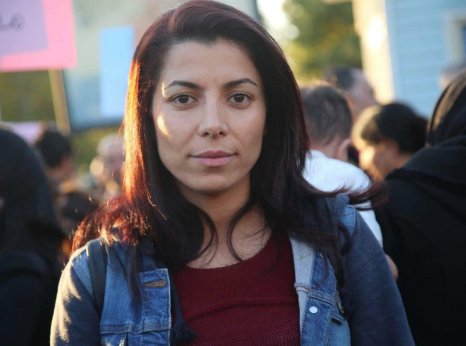Iran: Kurdish Dissident Sentenced To Death In Iran

On 1 August 2023, as Verisheh Moradi was travelling by car into Sanandaj, she was violently arrested by agents from Ministry of Intelligence. In an open letter written from Evin prison, dated early August 2024, Verisheh Moradi described how agents shot at the car she was in, shattering the windows and subsequently physically assaulting her during arrest. In this same letter, she wrote that on 9 April 2024 she was indicted for offences that included “membership in opposition groups” and “armed rebellion against the state” (baghi). She further highlighted in the letter that the Iranian authorities have “equated [her] struggle against terrorist forces like Da’esh [Islamic State (IS) armed group] with a struggle against the Islamic Republic of Iran”; she has subsequently denied taking up arms in Iran. In 2014, while in north-east Syria, she was injured during the armed conflict in Kobani, a Kurdish-majority town now under the de-facto control of the Autonomous Administration of north-east Syria, between the IS armed group and Kurdish armed groups and others.
While held in prolonged solitary confinement in section 209 of Evin prison, which is under the control of the Ministry of Intelligence, Verisheh Moradi wrote in her August 2024 open letter that she suffered from headaches, nosebleeds, and severe neck and back pains. On 14 May 2024, Verisheh Moradi was transferred from the women’s ward of Evin prison to section 209 for renewed interrogations and returned back to the women’s ward the next day on 15 May 2024. Since early May 2024, officials have also denied Verisheh Moradi visits with her family in reprisal for her activism, including in relation to the presidential elections in Iran. In early September 2024, the authorities opened a second case against Verisheh Moradi in connection to a protest she and several others, including arbitrarily detained human rights defender Narges Mohammadi, held in early August 2024 in the women’s ward of Evin prison against the Iranian authorities’ intensified use of the death penalty and the secret arbitrary execution of Reza Rasaei in connection to the September-December 2022 “Woman Life Freedom” uprising. In late October 2024, she was sentenced to a six-month prison sentence for “disobedience against government officials” in relation to this protest. Since her detention, Verisheh Moradi has carried out peaceful protests in prison, including a hunger strike she began on 10 October 2024, World Day Against the Death Penalty, to protest against the authorities’ use of the death penalty. Following urgent interventions by activists calling on her to end her hunger strike due to her poor health, Verisheh Moradi ended her hunger strike on 29 October 2024. She remained in poor health with intestinal problems, and shortly after her hunger strike was transferred out of prison for medical care and returned back to prison the next day. Her intestinal problems worsened and she developed intestinal bleeding. In mid-November 2024, her family arranged for her to obtain medical care outside prison but her transfer was blocked by prison and intelligence officials, according the Kurdistan Human Rights Network, a human rights organization. In October 2024, authorities also denied her ongoing access to the adequate health care she needs for her neck and back pain, including physiotherapy.
In the aftermath of the “Woman Life Freedom” uprising, Iranian authorities have intensified their use of the death penalty to instil fear among the population and tighten their grip on power. This escalation includes the use of the death penalty against ethnic minorities, including Baluchis and Kurds. On 29 January 2024, Iranian authorities arbitrarily executed Kurdish dissidents Pejman Fatehi, Vafa Azarbar, Mohammad (Hazhir) Faramarzi and Mohsen Mazloum, who were sentenced to death after a grossly unfair trial in late 2023. The authorities have also intensified their use of the death penalty against women detained on political-motivated charges. In July 2024, humanitarian aid worker Pakhshan Azizi, also from Iran’s Kurdish minority, was sentenced to death for “armed rebellion against the state” (baghi) in relation to her peaceful humanitarian and human rights activities, including assisting displaced women and children in north-east Syria. In 2023, Iranian authorities carried out at least 853 executions, with a disproportionate impact on Iran’s persecuted Baluchi ethnic minority who constitute about 5% of Iran’s population, yet accounted for 20% of all executions in 2023. In 2024, the Iranian authorities have continued executions, including of ethnic minorities and dissidents. Amnesty International opposes the death penalty in all cases without exception. The death penalty is a violation of the right to life as proclaimed in the Universal Declaration of Human Rights and the ultimate cruel, inhuman and degrading punishment.
Ethnic minorities in Iran, including Kurds, face widespread discrimination, curtailing their access to education, employment, adequate housing and political participation. Continued underinvestment in regions populated by ethnic minorities exacerbates poverty and marginalization. In 2023, security forces unlawfully killed with impunity dozens of unarmed Kurdish cross-border couriers (kulbars) who work between the Kurdistan regions of Iran and Iraq. Amnesty International has also repeatedly documented how the Iranian authorities target individuals from Iran’s Kurdish ethnic minority for arbitrary arrest and detention based on their real or perceived support for or association with Kurdish parties, and do not provide sufficient evidence of their direct or indirect involvement in internationally recognizable criminal offences.